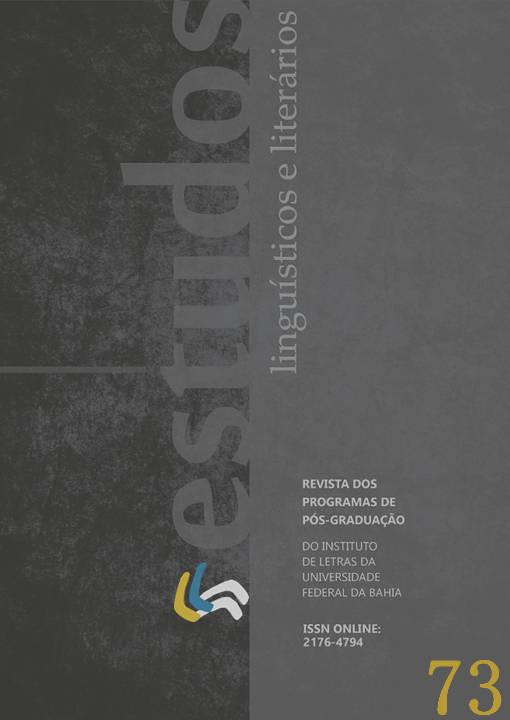THE DISPOSITION (OR NOT) OF PLURICENTRIC PORTUGUESE IN TEACHING THROUGH MEMRISE AND DUOLINGO
DOI:
https://doi.org/10.9771/ell.i73.48981Keywords:
Memrise, Duolingo, Pluricentric Portuguese, Teaching, PFLAbstract
This work observes the teaching of Portuguese as a foreign language in apps. For this, from a pluricentric bias, it describes two apps aimed at language teaching, and analyzes whether there is a predominance of a Portuguese language modality in relation to the other(s) in the Duolingo and Memrise tools. The methodology applied used the technical procedure of document analysis, in a qualitative approach, with restriction of the corpus to lower-level activities and information enclosed in the websites of the apps. The work finds its support on the ideas of Côrrea (2019), Kapp (2012) and Vincent-Layton (2019) for questions related to the teaching of PLE in apps, and on authors such as Hall (1996) and Batoréo (2014) for the debate on language and cultural aspects. The results point to the need for the apps to demarcate the Portuguese pluricentric character and exposing norms beyond Brazilian and European Portuguese.
Downloads
References
BATORÉO, Hanna J. Que gramática(s) temos para estudar o Português língua pluricêntrica? Revista Diadorim. Universidade Federal do Rio de Janeiro, v.16, p. 1-15, dez. 2014. Disponível em: https://revistas.ufrj.br/index.php/diadorim/article/view/4023. Acesso em: 03 mar. 2022.
BURKE, Peter. O que é História Cultural? Trad. Sérgio Góes de Paula. Rio de Janeiro: Zahar, 2005.
CLYNE, Michael. Pluricentriclanguages – Introduction. In: CLYNE, Michael (ed.). PluricentricLanguages: differingnorms in differentnations. Berlin: Mountoun de Gruyter, 1992, p. 1-10.
CORRÊA, Claudio. A gamificação e o ensino/aprendizagem de segunda língua: um olhar investigativo sobre o Duolingo. Linguagem & Ensino, Pelotas, v. 22, n. 4, p. 1020-1039, out-dez. 2019.
HALL, Stuart. A identidade cultural na pós-modernidade. Tradução: Tomaz Tadeu da Silva, Guaracira Lopes Louro. 11. ed. Rio de Janeiro: DP&A, 2006.
KAPP, Karl M. The gamification of learning and instruction: game-based methods and strategies for training and education. EUA: Pfeiffer, 2012.
LARAIA, Roque de Barros. Cultura: um conceito antropológico. 14. ed. Rio de Janeiro: Jorge Zahar, 2001.
MUHR, Rudolf. Non-Dominant Varieties of Pluricentric Languages. Getting the Picture. Frankfurt & Wien: Peter Lang. 2012.
NIETO, Sonia. Language, culture and teaching: critical perspectives. New York: Routledge, 2010.
O’DEA, Simon. Number of smartphone subscriptions worldwide from 2016 to 2026 (in millions). Statista, 2021. Disponível em: https://www.statista.com/statistics/330695/number-of-smartphone-usersworldwide/. Acesso em 29 de mar. 2022
ORTIZ, Renato. Cultura brasileira e identidade nacional. 5. ed. São Paulo: Brasiliense, 2006.
PETIT, Thomas; SANTOS, Gilberto Lacerda. A aprendizagem não formal da língua estrangeira usando o smartphone: por quê voltamos a metodologias do século XIX? Anais eletrônicos do 5º Simpósio Hipertexto e Tecnologias da Informação – Aprendizagem móvel dentro e fora da escola. UFPE, 2013. p. 1-21.
SILVA Augusto Soares da. O português no mundo e a sua estandardização: entre a realidade de uma língua pluricêntrica e o desejo de uma língua internacional. In: SILVA Augusto Soares da. O português na casa do mundo hoje. Braga: Universidade Católica Portuguesa de Braga, 2018, p. 111-132. Disponível em: http://hdl.handle.net/10400.14/33126. Acesso em: 03 mar. 2022.
SPAVEN, Emily. Q & A: Memrise co-founder talks diversity, mentorship and longterm plans. UKNT, 2016. Disponível em: https://www.uktech.news/news/qamemrise-co-founder-talks-diversity-mentorship-and-long-term-plans-20160926. Acesso em: 10 dez. 2022.


